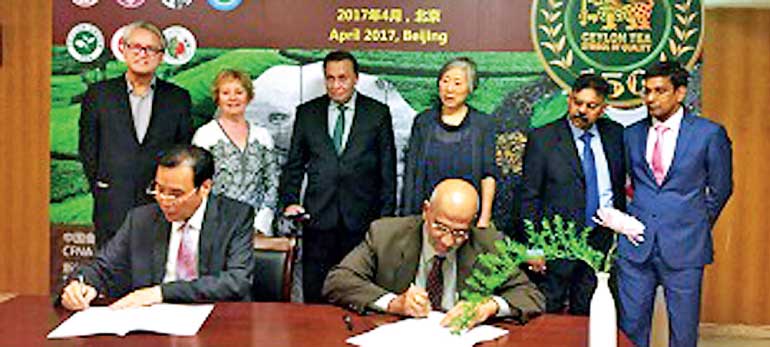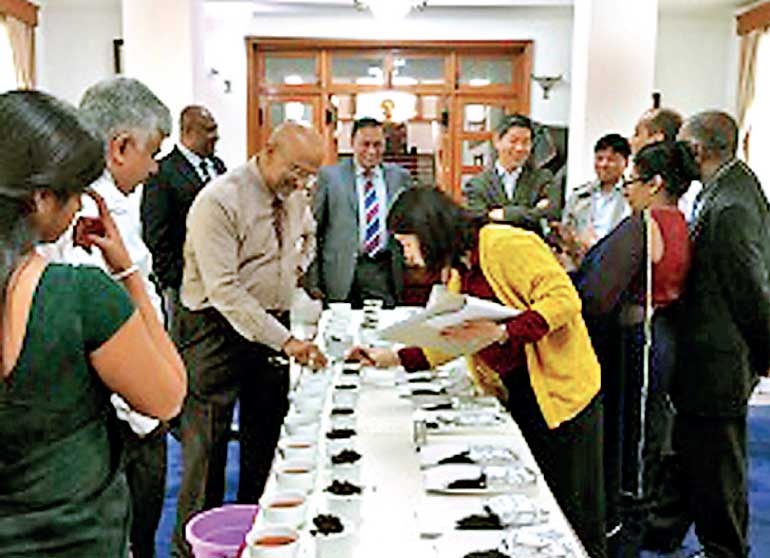Sunday Feb 22, 2026
Sunday Feb 22, 2026
Monday, 29 May 2017 00:41 - - {{hitsCtrl.values.hits}}

The ‘cradle of tea civilisation’ is China and nobody in the global tea fraternity disputes this fact. However, what happened a few days ago in Beijing, the ancient ‘Forbidden City’ was truly remarkable. The Sri Lanka tea industry which celebrates its 150 years’ anniversary in 2017 from a small beginning in 1867 through 19 acres for tea plantations in Loolcondera Estate utilising the plants (tea cultivar) brought originally from China, presented it to their ancestors. A ‘Ceylon Tea Week’ full of activities and events was organised in Beijing through a public/private initiative by Sri Lanka Tea Board and Colombo Tea Traders Association. The focal point in Beijing was the Embassy of Sri Lanka while several Chinese organisations under their Ministry of Agriculture, Ministry of Commerce and Ministry of Cooperatives unhesitatingly joined hands to make the historical attempt, truly memorable.
The ‘Ceylon Tea Week’ rallied around a few major projects. The Ceylon Specialty Estate Tea of the Year Competition, Award Ceremony for the Factories which produced the winning teas and a Charity Tea Auctions where five kilos each of the winning teas were sold to the Chinese audience at a hotly contested bidding system. The preliminary rounds of the tea competition were held in Sri Lanka and 98 samples of the best teas under the seven main agro-climatic regions as well as Ceylon Green Teas, CTC Teas and Innovative Teas/Hand Made Teas were taken to china for the final. The grand finale was concluded at the National Agriculture Exhibition Centre in Beijing amid the 9th International Chinese Tea Exhibition. The first charity tea auction took place at the Event Hall of the exhibition location during the following day. An amount of RMB 104,300 was raised at the first ever tea auction Sri Lanka organised for Ceylon Tea in China.
The second charity tea auction was held during the subsequent day at the Beijing Exhibition Center (Russian Centre). While all the gold winners were auctioned, only a few selected Silver and Bronze winners were identified for sale. An amount of RMB, 41,600 was realised through the second auction.
The total sum realised from both auctions amounted to RMB 145,900 which is approximately SL Rs. 3.2 million.
‘Shenzhen Shenbao’ a major buyer of Ceylon Teas who continue to patronise the importation of teas from Sri Lanka turned-out to be the highest bidder at the First Charity Tea Auction by securing the Nuwara Eliya Region Gold Award, Lovers Leap Garden Mark FBOP, at a price of RMB 10,000 for the five kilos package (approx. SL Rs. 44,000/kilo). The Pedro Estate under Kelani Valley Plantations own this garden marks. Fuzhou Bailitong was identified as a buyer of the largest number of winning tea lines at the Charity Auction. The Chinese importer was an active participant at the 1st ever Ceylon Tea Auction in China and strongly patronised some of the best teas from Sri Lanka while out bidding others to secure the lots.
The other largest Chinese Tea buyer was recognised at Baijing Chayuan Co. They also injected strong impetus to the Auction by purchasing four of the best lots.

China is the world’s largest producer and consumer of tea and also the second biggest exporter of tea after Kenya. The nation has been also identified as the country with the fastest growth for Ready to Drink (RTD) Teas although USA and Japan are considered as the two largest global customers in this category. From a traditional green tea consuming society for centuries, the elite, the new burgeoning middle class and the younger generation is moving gradually but steadily towards product innovations and novel differentiations even in the tea beverage.

Thus, imported black tea has been caught in this current. Sri Lanka is ideally placed to take the advantage of this new trend as the globally reputed supplier of quality orthodox black tea. Since 2010 to 2016 period, the growth of Chinese tea exports to the world has been calculated at an annual 1.4%. In direct contrast, the annual increase of foreign tea imports to China during the same period has been registered at 14.3%. This implies that, China is bound to import a larger volume of black tea during the years to come.
Sri Lanka who exported only just over one million kilos to China in 2010, has supplied 8 million kilos of Ceylon Tea in 2016. Further, Sri Lanka is the leader in the Chinese tea market in respect of the imported tea segment effectively relegating Vietnam and India to the second and third positions. Today, the Sri Lanka’s share in the Chinese tea imports has grown to 38% by end of 2016 and optimism are high for a rapid rise.